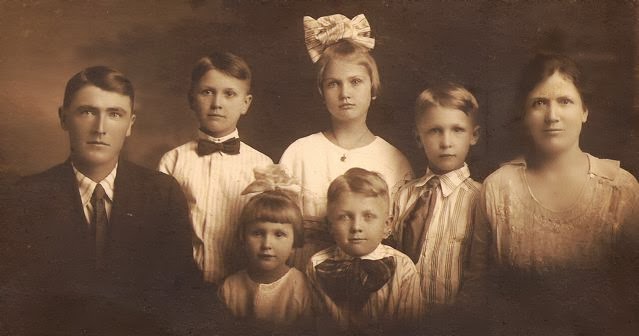A
valley of rocky fields, of rolling green hills, of scattered homes and churches
dotting the hillsides stretches for miles between the Walker Mountain Range and
the Clinch Mountain Range in southwestern Virginia. Called Rich Valley, it is the land of my grandmother
Mary’s ancestors going back as far as 1745, the first year the region was
opened to white settlers, but Mary didn’t know that. Although Clint's mother's family had been in the area since about 1810, Clint's father was a relative newcomer, having arrived there from North Carolina after the Civil War.
In
my grandparents’ childhood, the valley teemed with life. A country store where
people could buy anything from a soda pop to a plow stood at nearly every
crossroads or T-road and sometimes in between. A post office provided mail
service, and a country doctor rode a circuit. Court appointed magistrates held
court on their front porches or living rooms depending on the weather. Children
hiked miles to the Ellendale School perched about a quarter mile off the
main road on a barren hilltop like a sentry, but they seldom finished school
often having to drop out to help with farm work or to take care of little brothers
and sisters. Families averaged eight to ten children, so mothers needed all the
help they could get. Clint and his friends played games, such as Hide-and-Go-Seek or Roll the Hoop or Marbles, to name a few. Mary and her friends may have played those games, too, or jumped rope or played with homemade dolls. Certainly, the girls learned to "sew a fine seam" and cook and do all that a woman should know to manage a household. Boys learned their fathers' trades, in Clint's case, farming.
Bathrooms consisted of outhouses situated several yards from the
house; often a slop jar was kept under the bed for night use and emptied in the morning. Wouldn't you have loved that job! The family took baths once a week at most in a zinc tub in the kitchen using water heated over the wood-burning stove, and they all used the same bathwater. Dad usually bathed first and the youngest child last. Those who had running water in their homes ran a pipe from a spring to
the house, and the water ran full force day and night. If they couldn’t pipe
water into the house, they carried it from the spring in buckets. Women often
washed clothes on rocks in creeks rather than hauling water to the house. For
that reason, it was important to live next to a water source, such as a creek,
a spring, or a river.
If
they had a special need, people could travel on foot or horseback, and did,
across Walker Mountain into Marion, Virginia, the county seat, but in general,
they could find most everything they needed in the valley. The road to Marion
was a treacherous one that snaked over the mountain. It was best taken on foot
or on horseback, for a buggy might tumble off the edge of one of the switchbacks
on the downward trek.
Life
was fairly peaceful in those days, except for the threat of diseases, such as
dysentery—or “the flux,” as the people called it—diphtheria, and tuberculosis that
snuffed out too many young lives, including four of Clint’s siblings.
 |
| Posing for the camera in front of their home in Rich Valley, Virginia, are Daniel Absolum and America Pratt Troutman, their son Lee Roy and their dog--about 1903. |
(c) 2013 Z. T. Noble

My Rex would object to you naming the dog Rex! He/she is a cute dog! How about, "Perky," for the perky ears?
ReplyDeleteIf you can name a dog Hope, I can name one Rex. Your Rex ought to be honored. Love you, Linda :-)
DeleteMy entire family originates in Rich Valley, VA.
ReplyDeleteMy entire family originates in Rich Valley. I will visit just to renew my soul
ReplyDeleteMine, too. Visiting there renews my soul, too. Thanks for sharing your thoughts, Valley Girl.
DeleteMy entire family originates in Rich Valley, VA.
ReplyDelete